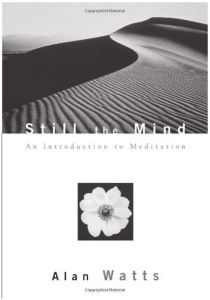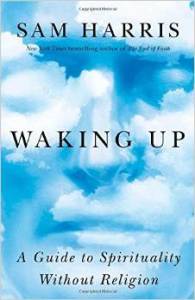Tag Archives: religion
Love letters to Richard Dawkins
Alan Watts: Think of Nothing
Still the Mind
 Excerpts from Alan Watts’ Still the Mind (An Introduction to Meditation)
Excerpts from Alan Watts’ Still the Mind (An Introduction to Meditation)
We fail to distinguish between the way things are and the way they are described.
One’s actual organic being is inseparable from the universe.
I found out that unless one has something to give people, there is nothing one can do to help them. Just because I thought I ought to help, it didn’t mean that I had anything to give.
The whole energy of the universe is coming at you and through you, and you are that energy.
You can only know what you can compare with something else.
What we call the past is simply the traces, the fade-outs trailing away from the present. Continue reading
Openly Secular
“The Air Force was ready to end a man’s military career because he would not submit to its religious demands. To secular Americans, requiring an oath to God is like asking a Jewish airman to swear, “So help me Jesus” or a Christian to say, “So help me Allah.” More »
Waking Up
 Just finished Waking Up – A Guide to Spirituality Without Religion by Sam Harris. Amazon reviews here; more about Mr. Harris here. Ideas I found highlighter-worthy below.
Just finished Waking Up – A Guide to Spirituality Without Religion by Sam Harris. Amazon reviews here; more about Mr. Harris here. Ideas I found highlighter-worthy below.
Our minds are all we have. They are all we have ever had. And they are all we can offer others. Every experience you have ever had has been shaped by your mind.
It is your mind, rather than circumstances themselves, that determine the quality of your life.
Everything we want to accomplish is something that promises, if done, it would allow us to finally relax and enjoy our lives in the present. […] Each of us is looking for a path back to the present: We are trying to find good enough reasons to be satisfied now.
Twenty percent of Americans describe themselves as “spiritual but not religious.”
Is it possible to be happy before anything happens, before one’s desires are gratified, in spite of life’s difficulties, in the very midst of physical pain, old age, disease, and death?
On one level, wisdom is nothing more profound than an ability to follow one’s own advice.
A true spiritual practitioner is someone who has discovered that it is possible to be at ease in the world for no reason, if only for a few moments at a time.
It is impossible for any faith, no matter how elastic, to fully honor the truth claims of another.
We manage to avoid being happy while struggling to become happy.
(Mindfulness is ) a state of clear, nonjudgmental, and undistracted attention to the contents of consciousness. […] Being mindful is not a matter of thinking more clearly about experience; it is the act of experiencing more clearly, including the arising of thoughts themselves.
The problem is not thoughts themselves but the state of thinking without knowing we are thinking.
Most people who believe they are meditating are merely thinking with their eyes closed.
Most of us spend every waking moment lost in the movie of our lives.
Meditation is a technique for waking up.
Investigating the nature of consciousness is the basis of spiritual life.
Consciousness is the one thing in this universe that cannot be an illusion.
If you shut your eyes at this moment, the contents of your consciousness change quite drastically, but your consciousness (arguably) does not.
Are we unconsciousness during sleep or merely unable to remember what sleep is like?
We are not aware of all the information that influences our thoughts, feelings, and actions.
I’ve forgotten most of what has happened to me over the course of my life.
Subjectively speaking, the only thing that actually exists is consciousness and its contents. […] Reality vastly exceeds our awareness of it.
(I am) a continuum of experience.
The feeling of “I” is a product of thought. […] Having an ego is what it feels like to be thinking without knowing that you are thinking.
(Thoughts are) transient appearances in consciousness.
We tell ourselves the story of the present, as though some blind person were inside our heads who required continuous narration to know what is happening.
Even if your life depended on it, you could not spend a full minute free of thought. […] We spend our lives lost in thought. […] Taking oneself to be the thinking of one’s thoughts is a delusion.
One must be able to pay attention closely enough to glimpse what consciousness is like between thoughts — that is, prior to the arising of the next one.
We imagine that we are conscious of our selves within our bodies. We seem to be riding around inside our bodies.
(The self) is the feeling that there is an inner subject, behind our eyes, thinking our thoughts and experiencing our experience.
It may be that an awareness of other minds is a necessary condition for an awareness of one’s own.
Consciousness is the prior condition of every experience; the self or ego is an illusory appearance within it; look closely for what you are calling “I,” and the feeling of being a separate self will disappear; what remains, as a matter of experience, is a field of consciousness — uncontaminated by its ever-changing contents.
Consciousness is intrinsically free of self.
That which is aware of sadness is not sad. That which is aware of fear is not fearful. Notice thoughts as they emerge and recognize them to be transitory appearances in consciousness. In subjective terms, you are consciousness itself — you are not the next, evanescent image or string of words that appears in your mind.
Consciousness is intrinsically undivided.
Nothing is intrinsically boring — boredom is simply a lack of attention.
We need not come to the end of the path to experience the benefits of walking it.
We read for the pleasure of thinking another person’s thoughts.
It is by ceasing to cling to the contents of consciousness — to our thought, moods, and desires — that we make progress.
There is experience, and then there are the stories we tell about it.
Consciousness is never improved or harmed by what it knows.
My Synoptic Gospels
“We accept the reality of the world with which we’re presented.” While watching The Truman Show (again) last night, I found myself wondering how I could be certain I’m not living in an elaborate TV show. Not sure I can.
It also occurred to me that I’m more comfortable getting my metaphysical/cosmic truths from movies than from books cobbled together during the Iron Age. If you’re willing to believe god spoke to Paul, Muḥammad, Joseph Smith and George W. Bush… why not Ridley Scott, Harold Ramis and Peter Weir.
My Synoptic Gospels are Blade Runner, Groundhog Day and The Truman Show. I might add to that list, much in the same way the early church tweaked the scriptures when necessary. Shoot, two of my guys are still alive. With a bit of luck and some persistence, I could probably meet them face to face.
Scott Adams: The user interface to reality
“The so-called ‘truth’ of the universe is irrelevant because our tiny brains aren’t equipped to understand it anyway. […] Our human understanding of reality is like describing an elephant to a space alien by saying an elephant is grey. That is not nearly enough detail. And you have no way to know if the alien perceives color the same way you do. After enduring your inadequate explanation of the elephant, the alien would understand as much about elephants as humans understand about reality. […] Today when I hear people debate the existence of God, it feels exactly like debating whether the software they are using is hosted on Amazon’s servers or Rackspace.”
God Hates You, Hate Him Back
“Men never do evil so completely and cheerfully as when they do it from a religious conviction.” — Blaise Pascal
“When I do good, I feel good; when I do bad, I feel bad, and that is my religion” — Abraham Lincoln
“Men will wrangle for religion; write for it; fight for it; die for it; anything but live for it.” — C.C. Colton
“I do not feel obliged to believe that the same God who has endowed us with sense, reason, and intellect has intended us to forgo their use.” — Galileo Galilei
“Some things have to be believed to be seen.” — Ralph Hodgson
“Generally speaking, the errors in religion are dangerous; those in philosophy only ridiculous.” — David Hume
“We have just enough religion to make us hate, but not enough to make us love one another.” — Jonathan Swift
“No man ever believes that the Bible means what it says: He is always convinced that it says what he means. “ — George Bernard Shaw
“My atheism, like that of Spinoza, is true piety towards the universe and denies only gods fashioned by men in their own image to be servants of their human interests.” — George Santayana
“Those of little faith are of little hatred.” — Eric Hoffer
“The religion that is afraid of science, dishonors God and commits suicide.” — Ralph Waldo Emerson
“With or without religion, you would have good people doing good things and evil people doing evil things. But for good people to do evil things, that takes religion.” — Steven Weinberg
“I am convinced that I am acting as the agent of our Almighty Creator. By fighting the Jews, I am doing the Lord’s work.” — Adolf Hitler, Mein Kampf, p. 65
Excerpts from God Hates You, Hate Him Back; Making Sense of The Bible by by
The Spirit of Zen
Last week I read The Spirit of Zen by Alan Watts and one paragraph has stuck with me. It touches on one of the (many) ways religion is viewed differently in the East.
“In the East the effectiveness of a religion is judged by its success in producing a comparatively small number of thoroughly enlightened men, for it is not believed possible fundamentally to alter the lives of vast numbers of people within the span of a thousand years or so. Great social changes are not expected; the religions of the East are more concerned with the enlightenment of some few individuals than of society as a whole, because society is made up of individuals, and will only become enlightened when, after thousands of years, more and more individuals have proved themselves fit for the highest knowledge, until the chosen few have become the whole community.”
Which reminds me of this excerpt from a novel by John Burdett (Bangkok Tattoo).
